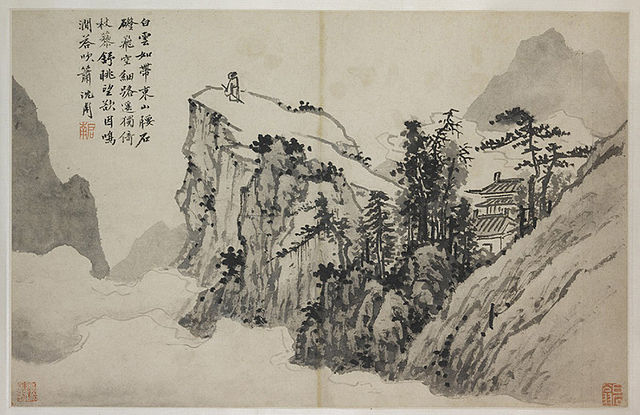For many people this is a most unpleasant subject and to be generally avoided. However, a number of thinkers and philosophers have pointed out that in this avoidance we are also running away from our own humanity. According to some this is the very reason for the diversions and distractions of our society. We would rather engage in all the endless “games” of our social existence rather than reflect on our own mortality and its meaning. Our own death is hardly ever the content of our reflections. But then most of the great spiritual traditions make it a point to look at the reality of death straight on, pondering its meaning and significance. In the Christian tradition there used to be that old cliché image of the old monk pondering a skull, the memento mori, the “remembrance of death,” that seemed to so many as bizarre and macabre, and to a certain extent it was that—especially when the original purpose of this “memento mori” was forgotten. Well, let us make a little effort in recovering the true significance of this remembrance.
First we need to consider the simple phenomenology of death–exactly what happens without attaching any of our meanings to it. We seem to go totally out of existence. We seem to be no more; there is no way back; nobody ever comes back into our own existence and experience. There is a striking finality to death. If you have ever been around a dead body, it is a chilling experience. This is the kind of thing that scares people and turns them off from considering the meaning of death. Modern life tries to shield us from this naked reality–just as it tries to immunize us from being sensitive to the language of Mother Nature. But the people of old had their own “escapes,” their own “narcotic” to soothe the pain of loss and finality. They created various stories about “rewards” and “punishments”–in other words in death our lives did not disintegrate into a meaningless nothingness. They created stories about various kinds of “paradises,” or perhaps a potential to “come back” in some form, thus defeating the seeming finality of death. And so it went.
But the deeper spiritual traditions always knew that the question of death–what is it anyway?– was fundamentally and foremost a question about our very identity. The Hindu holy man, Ramana Maharshi, held that the key to our whole spiritual life is the question: who am I? Indeed! And so many others in other traditions also focused the spiritual life on that kind of question in various ways. My own favorites, the Desert Fathers, certainly were on target most of the time, but their language often needs deciphering. Sometimes, though, it was very clear–consider the following story:
“Abba Poemen said to Abba Joseph, ‘Tell me how to become a monk.’ He said, ‘If you want to find rest here below, and hereafter, in all circumstances say, ‘Who am I? and do not judge anyone.’” (translation by Benedicta Ward)
This is a remarkably subtle story. The very notion of monkhood, of becoming a monk is tied to that most universal of all questions: who am I? Besides this question the other key elements of this story is this “rest”–exactly what is that anyway?–and then that phrase “in all circumstances.”
Let’s approach this from another angle. Our sense of identity is what we bring to “all circumstances” and this structures our responses and our experiences and our vision. We build up this sense of identity from two very different loci: the external, which is the most dominant, and the internal, which is highly valued in modern psychology. But the great spiritual traditions call all this structuring, both inner and outer, into question. And the reality of death provides the necessary leverage for this process of deconstruction.
Let’s consider briefly the so-called inner reality, that sense of “I-ness” that we seem to have deep within us. This reality forms the basis of what we generally call dualism. In other words there is that “solid” “I” that is me, and this stands in relation to everything “outside” it, including the Ultimate Reality which we call God. But most of the great spiritual traditions call this into question, especially Buddhism which does it in a very detailed and systematic way. Christianity for the most part has a lot of difficulty here. Basic Christian thought and piety has this aura of unremitting dualism–there is “I” and then in relation to me there is “God,”–the I-Thou relationship. Let’s face it, most of standard Christian piety (and all other theistic religions) are locked into this. This is what Abhishiktananda had so much trouble with. Christian mysticism of course tries to transcend this dualistic language in various ways. And you have to be sensitive to what is going on in that language to understand the astonishing depths there, as in Meister Eckhart for example.
But now getting back to our main topic, the reality of death seems to really challenge this sense of “I”-ness that we have. In death, that “knot” at the core of my being which is called “I,” “me,” seems to get undone, and this is totally scary. Death seems to make one nameless, a kind of void, a “black hole of existence,” sucking up all that you are as you vanish into it. That’s why for people whose “I-ness” was of paramount importance built huge monuments to themselves in preparation for death, like the pharaohs of Egypt to this day’s “important people.” “Who am I?” if this knot gets totally undone. Apparently there is no self there, precisely no-self. Whatever is “there,” if even that can be said, it cannot be pointed to or named or found on any “map,” theological or psychological.
Now consider the external locus of our selfhood and this sense is most superficial but also most dominant in social life and most evident. We live off what others think of us, either bad or good. Praise or blame is critical to our sense of self. Some people are totally enclosed in that sense of self and live in constant anxiety and “unrest,” wondering what “feedback” will come to them in all circumstances which announce to them who they are. In growing up, children are naturally passing through such a phase but now we are speaking of fully grown mature adults whose sense of self is that fragile. This is not just a modern problem. Ancient and traditional societies, East and West and in all religions, were/are built around the notions of “honor” and “shame.” A totally external locus of identity becomes the measure of your humanity and “worth.” Sometimes with very sad and tragic consequences. Another very common source of identity is possession: all we have, all the stuff around us, wealth–but even poverty can be used in this regard, religious garb, institutions, nationality, etc. What makes death so harrowing to these folks is that it comes like a thief and takes it all away, everything that I have used to prop up my sense of identity. We all know some of the key Zen and Desert Father stories where they encounter this thief. Lots of humor there but also very deep truth. But here is another Desert Father story that is apt:
“A brother came to Abba Macarius the Egyptian, and said to him, ‘Abba, give me a word, that I may be saved.’ So the old man said, ‘Go to the cemetery and abuse the dead.’ The brother went there , and abused them and threw stones at them; then he returned and told the old man about it. The latter said to him, ‘Didn’t they say anything to you?’ He replied ‘No.’ The old man said, ‘Go back tomorrow and praise them.’ So the brother went away and praised them, calling them, ‘Apostles, saints and righteous men.’ He returned to the old man and said to him, ‘I have complimented them.’ And the old man said to him, ‘Did they not answer you?’ The brother said no. The old man said to him, ‘You know how you insulted them and they did not reply, and how you praised them and they did not speak; so you too if you wish to be saved must do the same and become a dead man. Like the dead, take no account of either the scorn of men or their praise, and you can be saved.”
(translated by Benedicta Ward)
This story has been wrongly and grossly interpreted as an invitation to a kind of human insensitivity, as if that could ever be any kind of solution to anything. Rather this story is an ingenious expansion of that key question: who am I? And it is through the reality of death that we discover what that is all about. That exercise that Abba Macarius created for this young monk was meant to deconstruct all his usual social responses and so his usual social identity based on these various external loci. Death reveals the human stripped of everything, absolutely everything. What is left? Only that transcendent locus of our identity that is totally unnameable, unspeakable, something that one cannot “point to,” etc. For the Desert Fathers this was what they tried to express in such terms as “rest,” “being saved,” “quies” (Latin), or “hesychia” Greek. Recall what Jesus said in the Gospel about having the “right kind” of treasure, the kind that neither moth nor rust can eat away, nor thief can steal. Death is the moth and rust and thief and will take away everything that is part of that external locus of identity. Death will reveal who I really am. So then, who am I?
Consider now a very different example: a poem by Thomas Merton about Ernest Hemingway. It was written right after Hemingway’s death. What you have to remember about Hemingway is not only that he was a master of English prose, but also that he had this self-constructed image of himself which was very critical to his self-understanding: that of the macho writer/adventurer/big-time hunter/male hero whom women could not help but adore, etc. Well, as he got into old age that self-image began to crumble and sent him reeling into bouts of depression. Hemingway did not ask himself, “Who am I?” He assumed his identity was contained in his self-image, and when this “story” could no longer be sustained he totally collapsed and appears to have committed suicide. Here is Merton’s take on all this:
An Elegy for Ernest Hemingway
“Now for the first time on the night of your death your name is
mentioned in convents, ne cadas in obscurum.
Now with a true bell your story becomes final. Now men in
monasteries, men of requiems, familiar with the dead, include you
in their offices.
You stand anonymous among thousands, waiting in the dark at
the great stations on the edge of countries known to prayer alone,
where fires are not merciless, we hope, and not without end.
You pass briefly through our midst. Your books and writings
have not been consulted. Our prayers are pro defuncto N.
Yet some look up, as though among a crowd of prisoners or displaced
persons, they recognized a friend once known in a far country.
For these the sun also rose after a forgotten war upon an idiom
you made great. They have not forgotten you. In their silence you
are still famous, no ritual shade.
How slowly this bell tolls in a monastery tower for a whole age,
and for the quick death of an unsteady dynasty, and for that brave
illusion: the adventurous self!
For with one shot the whole hunt is ended!”
A haunting last line! A supreme irony too, for what this big-game hunter was really hunting for without realizing it was his true self. This is what we are mostly doing in all our activities really, in all our attempts to be “somebody.” Without realizing it we are actually always trying to answer that question, who am I? So death which ends this “hunt” seems very scary, and so we create all kinds of myths in order to “unscare” ourselves. But I will conclude with a Desert Father story that illustrates how deeply and with what subtlety the old masters understood this key question and its relation to death:
“They said that a certain old man asked God to let him see the Fathers and he saw them all except Abba Anthony. So he asked his guide, ‘Where is Abba Anthony?’ He told him in reply that in the place where God is, there Anthony would be.”
In death Anthony loses every marker of self/identity. (You might say this language is a radicalization of the sannyasi ideal; in fact the authentic sannyasi is the clearest living symbol of all that I have been trying to say above.) The ultimate truth and the really real are paradoxically manifest when there is no more “place” for Anthony, for Anthony is now a no-self whose locus is nowhere except in God.



